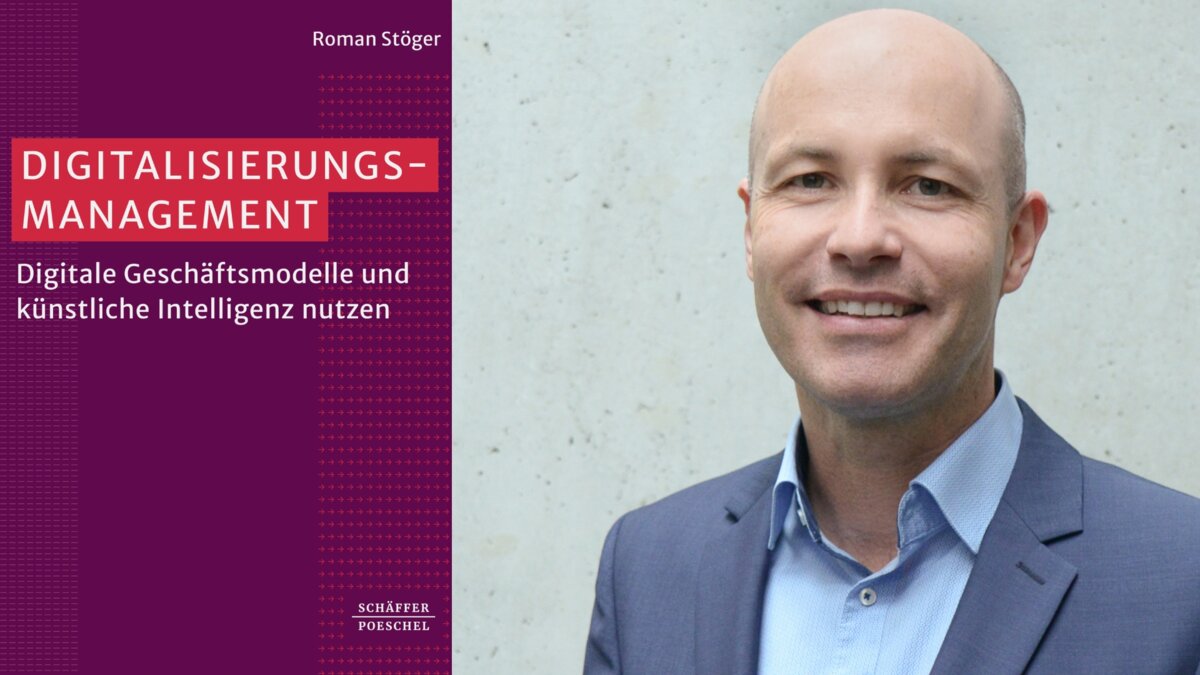"Big Results instead of Big Data": How digitization works
- 08.01.2025
- General

Prof. Dr. Roman Stöger with his book Digitalization Management. Using Digital Business Models and Artificial Intelligence.
How does digitization become entrepreneurially effective? Prof. Dr. Roman Stöger explains in an interview with Prof. Dr. Bert Neumeister why big results instead of big data is the key.
What is important from a business perspective when it comes to the usage of digitalization? Prof. Dr. Bert Neumeister from the Marketing and Communication Management degree program at the University of Applied Sciences Kufstein Tirol discusses this topic with Prof. Dr. Roman Stöger, professor of strategic corporate management at the University of Applied Sciences Kufstein Tirol. His current book publication with the publishing company Schäffer-Poeschel is titled Digitalisierungsmanagement. Digitale Geschäftsmodelle und Künstliche Intelligenz nutzen.
What is your new book about and what topics does it cover?
Roman Stöger: The key question is: how can digitization be made to work for your business? The methods and tools presented in this book have been tried and tested in practice. They cover topics ranging from a digitization strategy and the digital business model to issues of organization, leadership, and corporate culture in the context of digitization. The book also covers application impulses for artificial intelligence, because the boundaries here are often fluid.
In your book, you place a great deal of emphasis on the topic of effectiveness. Why is this aspect so crucial?
Roman Stöger: The biggest bottleneck today is not ideas, but implementation. Many empirical studies show that the successful implementation rate for digitization topics is only 30%. Data structures, systems and the cloud are important, but the decisive step is a different one: to design digitization in such a way that customers have a real benefit and the company becomes more productive. There is constant talk of potential. But at the end of the day, only one thing counts in business: a concrete result. That's exactly what the saying 'big results instead of big data' means.
To what extent are digitization and artificial intelligence connected?
Roman Stöger: Digitization provides the basis for AI. This means that AI requires digitization, but not necessarily the other way around. Before companies delve deeply into AI topics, they should first take full advantage of the opportunities offered by digitization. I am always amazed at how many companies philosophize about these topics, but at the same time do not have their master data under control, let alone use it.
Your book is aimed primarily at managers. What do they need to bear in mind in the digital age?
Roman Stöger: First of all, always put the market, customer and user at the center. That is the benchmark for digitization and AI. Secondly, it is about prioritization and consistent project management in the implementation. And thirdly, there must be accompanying organizational development and change management so that there are no rejection effects.
In a lecture, you once pointed out that Kufstein has become a competitor of car manufacturers in the digital world.
Roman Stöger: We are undergoing a huge structural change because digitalization and AI are transforming many industries: mobility, communication, trade, industry, media, etc. And that also means that boundaries are becoming blurred. The city of Kufstein now offers car sharing, making it a competitor to car manufacturers because more and more people in Kufstein are deciding against a private car. In the old world, the sectoral boundary was clear: on the one hand, the municipality of Kufstein and, on the other, a carmaker. In the new world, these clear-cut boundaries are becoming increasingly rare.
How do you see the opportunities and risks of AI for the economy and society?
Roman Stöger: AI is always both an opportunity and a risk. For example, AI threatens job losses, but at the same time it can alleviate the labor shortage. We have to be careful about negative developments – such as surveillance, manipulation and the general issue of AI's momentum. Digitalization and AI have to be taught in school starting in the first grade because a revolution is underway that we can't even imagine today.
ABOUT THE PERSON:
Roman Stöger was an associate partner at the Management Zentrum St. Gallen for eighteen years. His supervisory and advisory mandates include companies from industry, trade, NPO and financial services of all sizes. He has published numerous books and articles on the topics of strategy, digitalization, AI, productivity, organization and leadership. In 2016, he was appointed to the expert commission Digitalization and Innovation as part of the German Federal Ministry of Economics.
